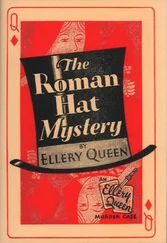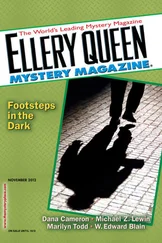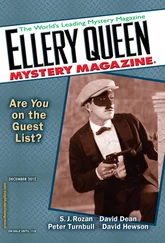Lenore had been depressed. Her mother, she had told her aunt, had been hounding her to “get married and stop running from one man to another like a stupid high school girl.” Lenore had been deeply in love with a boy who was killed at St.-Lô, a poor boy of Jewish origin of whom Mrs. Richardson had violently disapproved; “Mother doesn’t understand and she won’t let him alone even when he’s dead.” Mrs. Cazalis had let the girl pour out her troubles and then had tried to get her to bed. But Lenore said “with all this pain” she would stay up reading; the heat was bothering her, too. Mrs. Cazalis had urged her not to stay up too late, had kissed her good night, and left. It was about 10 P.M. She had last seen her niece reclining on the chaise, reaching for a book, and smiling.
At home, Mrs. Cazalis had wept, her husband had soothed her, and he had sent her to bed. Dr. Cazalis was staying up over an involved case history and he had promised his wife he would call Lenore before turning in, “as the chances are Della and Zach won’t be rolling in till 3 or 4 in the morning.” At a few minutes past midnight the doctor phoned the Richardson apartment. There was no answer. Five minutes later he tried again. There was an extension in Lenore’s bedroom so that even if she had gone to sleep the repeated rings of the phone should have aroused her. Disturbed, Dr. Cazalis had decided to investigate. Without awakening his wife, he had walked over to the Park-Lester and found Lenore Richardson on the chaise with the salmon-colored silk cord imbedded in her flesh, dead of strangulation.
His in-laws had still not returned. Except for the dead girl, the apartment was empty. Dr. Cazalis had notified the police and, finding the telephone number of Mrs. Richardson’s Westchester friends on the foyer table — “I left it for Lenore in case she felt sick and wanted me to come home,” sobbed Mrs. Richardson — he had notified them that something had “happened” to Lenore. He had then phoned his wife to come at once, as she was, in a taxi. Mrs. Cazalis had hurried over with a long coat thrown over her nightgown to find the police already there. She collapsed, but by the time the Richardsons arrived she had recovered sufficiently to take charge of her sister — “for which,” muttered Inspector Queen, “she ought to get the Nobel peace award.”
The usual variation on the theme, thought Ellery. Chips of incident and accident, the death-colored core remaining. The non-crackable nut.
(“I took one look at the silk cord around her neck,” said Dr. Cazalis, “and I recall only one coherent thought. ‘The Cat.’”)
Pending daylight examination of the terrace and roof — the living room French doors had stood open all evening — they were inclined to the belief that the Cat had gained entrance boldly through the front door by way of the self-service penthouse elevator. Mrs. Cazalis recalled having tried the front door from the foyer on her way out at 10 o’clock and, at that time, the door was locked; but on her husband’s arrival about 12:30 A.M. the door was wide open, held ajar by a doorstop. Since the doorstop revealed the dead girl’s fingerprints, it was evident that Lenore had propped the apartment door open after her aunt’s departure, probably to encourage some slight circulation of air; it was a stifling night. The night doorman remembered Mrs. Cazalis’s arrival and departure and Dr. Cazalis’s arrival after midnight; but he admitted that he had slipped out several times in the course of the evening to get a cold bottle of beer at the delicatessen at 86th Street and Madison Avenue and that, even while he was on duty in the lobby, a prowler could have got past him unnoticed: “It’s been a hot night, half the tenants are out of town, and I snoozed on the lobby settee on and off the whole evening.” He had seen and heard nothing out of the ordinary.
Neighbors had heard no screams.
The fingerprint men turned up nothing of interest.
Dr. Prouty of the Medical Examiner’s office was unable to fix the time of death more accurately than the limits defined by Mrs. Cazalis’s departure and her husband’s arrival.
The strangling cord was of tussah silk.
“Henry James would have called it,” said Dr. Cazalis, “the fatal futility of facts.”
They were sitting around at dawn in the wreckage of the night over cold ginger ale and beer. Mrs. Cazalis had prepared a platter of cold chicken sandwiches to which no one applied but Inspector Queen, and he only under Ellery’s bullying. The body had been removed on the official order; the sinister blanket was gone; a breeze blew from the penthouse terrace. Mrs. Richardson was asleep in her bedroom under sedation.
“With all respect to the Great Casuist,” replied Ellery, “it’s not the futility of facts that’s fatal, Doctor, but their scarcity.”
“In seven murders?” cried the doctor’s wife.
“Seven multiplied by zero, Mrs. Cazalis. Well, perhaps not quite, but it’s very difficult.”
Inspector Queen’s jaws were going mechanically. He seemed not to be listening.
“What can I do!”
They were startled. Lenore’s father had been still so long.
“I’ve got to do something. I can’t just sit here. I have a great deal of money...”
“I’m afraid money won’t do it, Mr. Richardson,” said Ellery. “Monica McKell’s father had the same idea. His offer of $100,000 reward on August 10 hasn’t even been threatened. It’s simply increased the work of the police.”
“How about turning in, Zach?” suggested Dr. Cazalis.
“She didn’t have an enemy in the world. Ed, you know that. Everyone was mad about her. Why did this... why did he pick Lenore? She was all I had. Why my daughter?”
“Why anybody’s daughter, Mr. Richardson?”
“I don’t care about the others. What do we pay our police for!”
Richardson was on his feet, his cheeks cerise.
“Zach.”
He sagged, and after a moment he mumbled something and went out very quietly.
“No, dear, let him go,” said the psychiatrist quickly to his wife. “Zach has that sturdy Scotch sense of the fitness of things and life is very precious to him. But I’ve got to worry about you. Your eyes are drooping out of your head. Come on, darling, I’ll take you home.”
“No, Edward.”
“Della’s asleep—”
“I won’t go without you. And you’re needed here.” Mrs. Cazalis took her husband’s paw. “Edward, you are. You can’t stay out of this now. Tell me you’ll do something.”
“Certainly. I’ll take you home.”
“I’m not a child!”
The big man sprang to his feet. “But what can I do? These people are trained to this sort of thing. I wouldn’t expect them to walk into my office and tell me how to treat a patient!”
“Don’t make me seem stupid, Edward.” Her voice had sharpened. “You can tell these gentlemen what you’ve told me so many times. Your theories—”
“Unfortunately, that’s all they are. Now let’s be sensible. You’re going home this—”
“Della needs me.” The taut voice was stretching.
“Darling.” He seemed startled.
“You know what Lenore meant to me.” Mrs. Cazalis broke. “You know, you know!”
“Of course.” His glance warned Ellery and Inspector Queen off. “Lenore meant a great deal to me, too. Now stop, you’ll make yourself very ill.”
“Edward, you know what you said to me!”
“I’ll do what I can. You’ve got to cut this out, dearest. Stop it.” Gradually, in his arms, her sobs subsided.
“But you haven’t promised.”
“You needn’t go home. I think you’re right. Della will need you. Use the guest room, dear. I’ll give you something to make you sleep.”
“Edward, promise!”
Читать дальше












